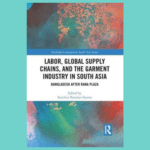 Sanchita Saxena participated in the Bellagio residency program in 2016. During this residency she worked on Labor, Global Supply Chains, and the Garment Industry in South Asia: Bangladesh After Rana Plaza. She is the executive director of the Institute for South Asia Studies and the director of the Subir and Malini Chowdhury Center for Bangladesh Studies at UC Berkeley, and a lecturer of responsible business at the Haas School of Business.
Sanchita Saxena participated in the Bellagio residency program in 2016. During this residency she worked on Labor, Global Supply Chains, and the Garment Industry in South Asia: Bangladesh After Rana Plaza. She is the executive director of the Institute for South Asia Studies and the director of the Subir and Malini Chowdhury Center for Bangladesh Studies at UC Berkeley, and a lecturer of responsible business at the Haas School of Business.
A few words with Sanchita
“I was at the very beginning of the book when I came to Bellagio, with only an outline of various chapters. While there, I wrote my draft introduction. The time at Bellagio gave me the time I needed to think and read and organize the edited volume in a beautiful setting and away from other pressures.
“I spoke with many of the residents about the issues raised in the book and they were very helpful in thinking through the different problems. It was useful to present these ideas to a non-academic audience – or to those who don’t necessarily have expertise on the issues – but care about it nonetheless.”
Synopsis
There is a greater cost to fast fashion. Deadly risks are taken by factory owners under pressure from client demands. In 2013, an eight-story commercial building collapsed in Bangladesh, killing 1,134 people, most of whom were garment factory workers. It is considered the deadliest structural failure accident in modern human history.
Using this disaster as a departure point, Labor, Global Supply Chains, and the Garment Industry in South Asia: Bangladesh After Rana Plaza presents an interdisciplinary analysis to address the radical industrial changes that are being or should be implemented in the wake of the catastrophe. It engages with international brands, the private sector, and civil society to strategize the future of the industry and advocates for those who depend on it for their livelihood.
Explore More
To find out more about Sanchita’s work, visit her website.
Or you can listen to her discuss the impacts of the pandemic on garment industry workers on an episode of the Asia Global podcast.
Updates

September 2022
Welcome to the second Bellagio Bulletin, where you’ll learn of the many ways that the Bellagio Center has supported the work of the world’s leading thinkers. We, at The Rockefeller Foundation, are committed to gender equality and the Bellagio Center has helped us to advance the global gender equality agenda. The activities and conversations at […]
More